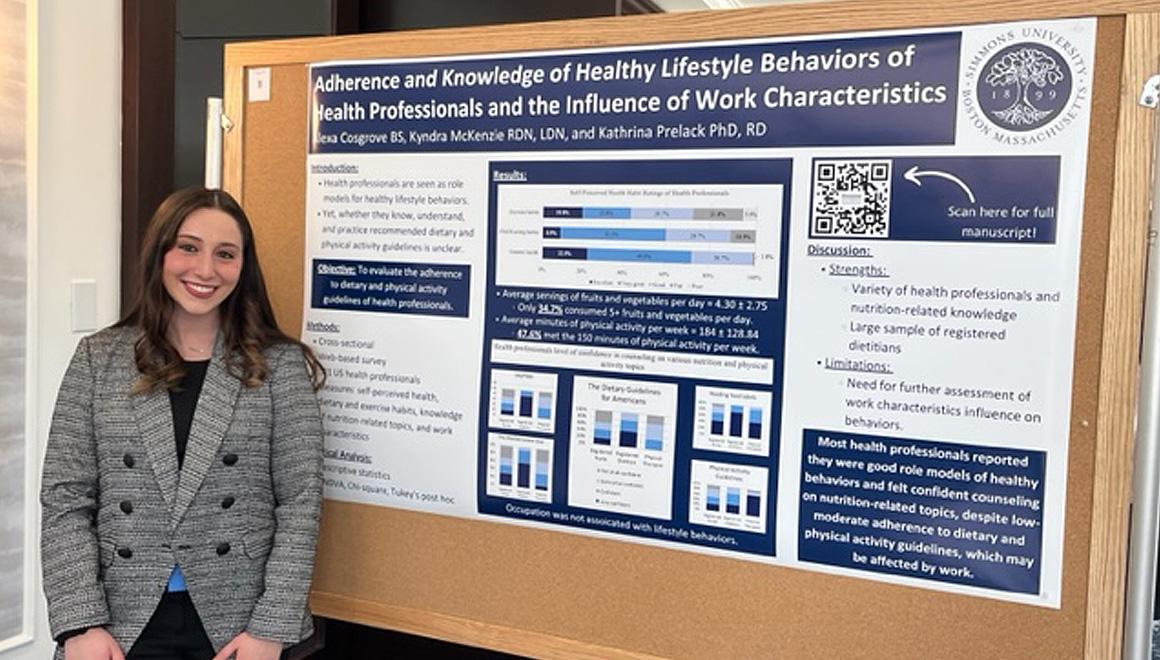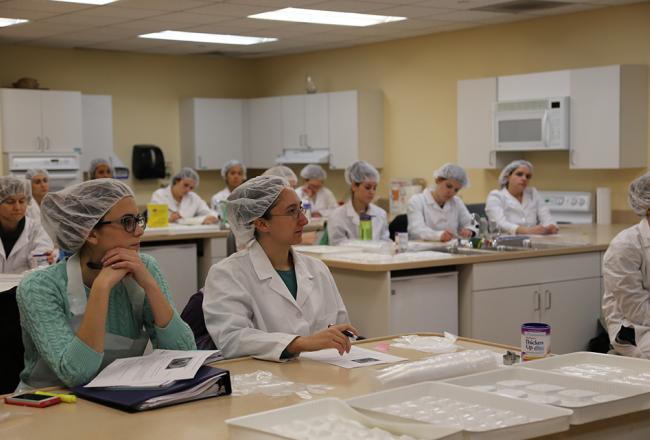Nutrition and Health Promotion
Simmons University’s Master of Science in Nutrition and Health Promotion program is designed to help students develop an advanced understanding of nutrition, fitness, and wellness. The program provides training in nutrition science and health promotion strategies to prepare students to be leaders in the dynamic field of nutrition.

Students can choose to enroll in our fully online program or attend classes in the campus-based program with state-of-the-art facilities surrounded by the world-renowned teaching hospitals along Longwood Avenue in Boston.
Our faculty members are experts in their respective fields and are committed to providing a comprehensive education that is both evidence-based and practical. Our students come from backgrounds in nutrition, dietetics, exercise physiology, biology, health sciences, and public health. Upon graduation, they are prepared for a wide range of careers in areas such as research, community nutrition, and private practice. Combining the MS with a didactic program in dietetics (DPD) and a dietetic internship, graduates of the program are prepared to work in the field of dietetics and clinical nutrition as a Registered Dietitian Nutritionist.
"Great classes with interesting latest-to-date material, awesome faculty that were very approachable, able to create a sense of community in an online classroom setting even though my cohorts were all in other states (in fact, I still keep in touch with many of them!). "
- Online graduate student in nutrition.
Why study Nutrition and Health Promotion?
The World Health Organization defines health promotion as the process of enabling people to increase control over, and to improve, their health. It moves beyond a focus on individual behavior towards a wide range of social and environmental interventions designed to promote wellness by addressing and preventing the root causes of poor health, rather than focusing on treatment and cure alone.
As more people become interested in healthy eating and preventive health, the demand for nutrition professionals is growing. By studying nutrition and health promotion, you can position yourself to pursue a rewarding career in a growing field and make a positive impact on the lives of others.
What will you learn?
Throughout the program, students study the science behind nutrition and its role in health promotion, as well as the social and behavioral factors that influence dietary behavior.
Students learn about the theory and application of nutritional wellness and health promotion, including how to critically evaluate scientific evidence to inform their practice.
"The core curriculum is very well rounded. When I entered my internship I was more prepared and had been exposed to more (clinical, community, research experiences) than my peers. I credit the program and professors for that."
- Graduate student in nutrition.
Students also develop skills to effectively communicate nutrition messages to diverse audiences.
Students customize their plan of study by choosing one of two tracks: Applied Nutrition Science or Entrepreneurship.
Applied Nutrition Science (formerly the Research Track)
The Applied Nutrition Science track provides students the opportunity to develop health promotion communication skills and research skills to better interpret nutrition science and apply it to clinical, community, and other practice settings.
Entrepreneurship
The Entrepreneurship track is designed for students interested in developing entrepreneurial ventures in the nutrition field. Students gain knowledge and skills that will help them formulate a new creative venture or innovation for the for-profit, not-for-profit, or government sector. The curriculum includes courses from the Simmons School of Management and culminates with the development of a business plan that aligns with the student's career goals.
"It was really cool to try to see ourselves as future business leaders…I appreciate the new awakened curiosity of imagining a future where we could be our own boss."
- Entrepreneurship Student
Our Nutrition master's program can be completed in one academic year, or in two to three years of part-time study (for U.S. students only). On-campus classes are offered in the evening with some individual courses offered online, and students enrolled in our fully online option take all courses online. Students pursuing the online degree have the same opportunities to customize their program as students in the on-campus program by selecting from either the Applied Nutrition Science Track or Entrepreneurship Track.
Pathways to the Master's in Nutrition and Health Promotion
- Master's program only
- Combined MS/DPD program
- Combined MS/DI programs
- Simmons DI
- DI Partner Programs (for more information see tab below)
- Accelerated BS/MS 4+1 program
What can you do with a Master's degree in Nutrition and Health Promotion?
Graduates of the program have pursued a variety of career paths in the field of nutrition and health promotion, working in venues such as public health organizations, hospitals, schools, community-based organizations, private practice, and the food industry. They seek to improve the health of individuals and communities through roles such as nutritional counseling, program management, and community research.
Learn more about our Master's in Nutrition and Health Promotion
Our traditional on-campus program provides a high quality education for students in the greater Boston and eastern New England area. The online format offers the same quality curriculum in a convenient format, perfect for working professionals and busy individuals across the country. Ready to learn more? Request more information or visit our Admissions page today!
Nutrition Programs at Simmons University
Our programs are designed to extend beyond acute care issues to promote community health and the practical aspects of working in the field of nutritional wellness.
Our Faculty
The faculty in the Nutrition Department are nationally known in their area of expertise. Each has years of practice experience in their areas of teaching. They have served in state government boards and national committees, and won national awards.
They are dedicated educators committed to the success of our students. Each student will have a faculty advisor in nutrition who will provide individualized guidance for coursework selection and career planning.















